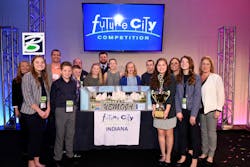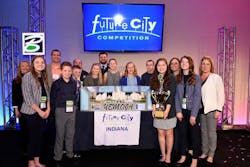Indiana school wins 28th annual Future City Competition
Bentley Systems and DiscoverE, a network of volunteers that introduces students, parents and educators to engineering and provides hands-on experiences, announced that Yemoja, a city of the future designed by students from Norwell Middle School in Ossian, Indiana, won the grand prize at the 2020 Future City Competition.
(Source: Bentley)
The competition finals, held at the Hyatt Regency Washington in Washington, D.C., is organized by DiscoverE and sponsored in part by Bentley. Sixth, seventh, and eighth-grade students from 1,500 schools in more than 40 regions, as well as teams from Canada, have imagined, designed and built cities for the 2019-2020 Future City Competition. This year’s theme, clean water, challenged students to identify an urban water system threat and develop a futuristic solution to ensure a reliable supply of clean drinking water.
Students from Norwell Middle School, including Jordyn Xayyachack, Teagan Lesley, Madeline McCabe, Nevada Lenwell, Morgan Batdorff, Connor Reed, Cassandra Coyne, Eli Randol and Lukas Mashuda, paired with educators Bill Bostain, Stephanie Scott and Bonnie Dickey as well as volunteer mentor Albert Bostain, won a trip to Space Camp at the U.S. Space & Rocket Center in Huntsville, Alabama, as well as $7,500 provided by Bentley, for their school’s STEM program.
Maggie Dressel, program manager of Future City, said the Norwell Middle School team won due to its innovative approach to tackling a problem faced by many real-world cities. "In the course of their research, the team identified plastics as one of the issues," Dressel said. "In an effort to combat that, they did an in-school campaign on plastic pollution and collected 5,000 plastic bottle caps, melted them down, and used the material to create the model."
Bentley CIO Claire Rutkowski gave a presentation during the finals that discussed the challenges future cities will face, including urbanization, climate change, water and food scarcity and population growth. She said some innovations on the way that will improve future cities and help address challenges include digital twins to help design and manage assets, 3D printing to quickly produce individual components and entire buildings and new high-tech materials, such as concrete that can heal itself through bacteria that generates calcite as it gets wet, or sidewalks that generate power through the kinetic energy of foot pressure.


